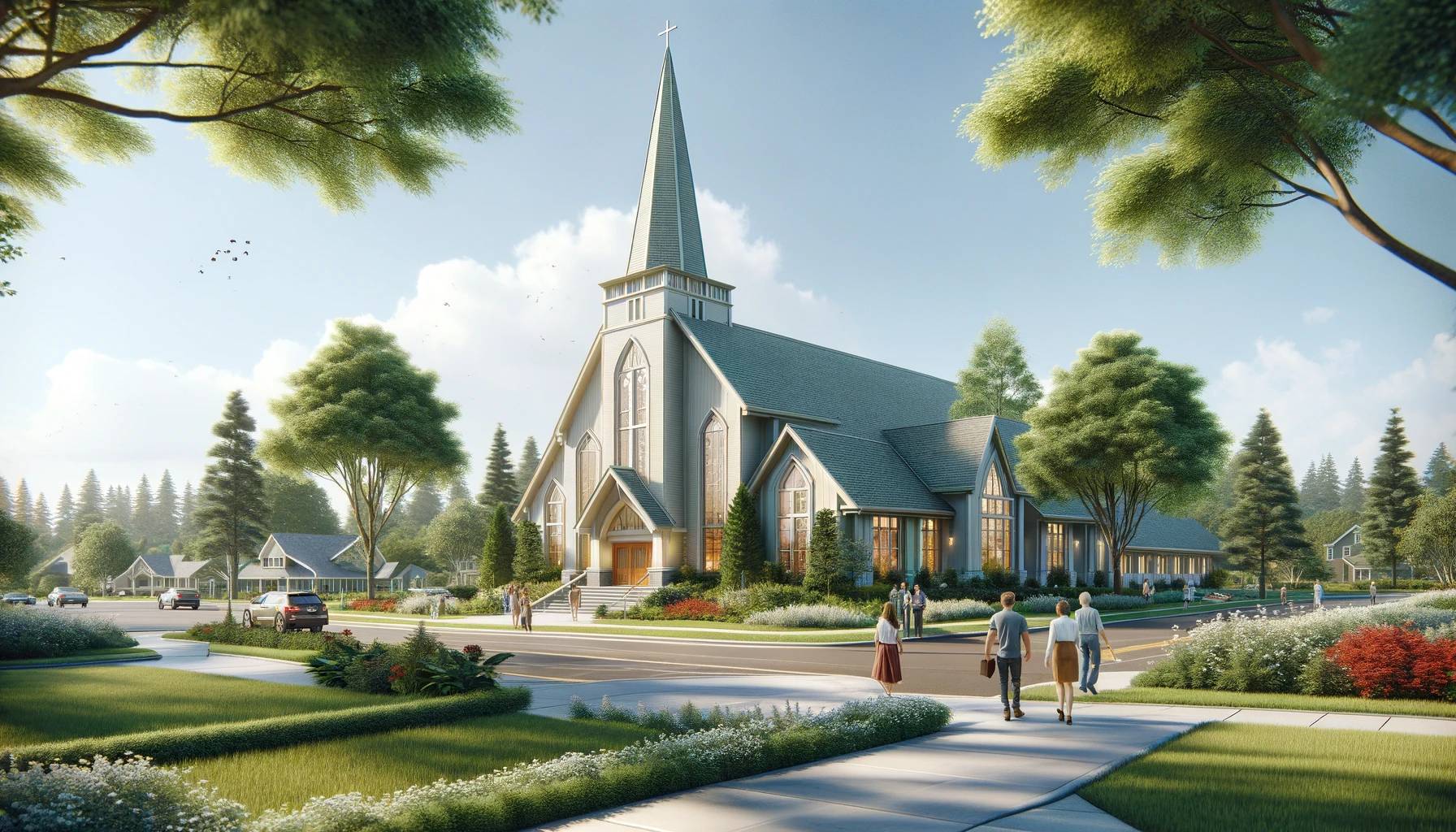Home>Theology and Spirituality>What Is A Reformed Baptist?


Theology and Spirituality
What Is A Reformed Baptist?
Published: February 21, 2024
Ericka Andersen, an editor at Christian.net, expertly merges digital strategy with content creation, focusing on faith and societal issues. Her communication skills enhance the platform's engaging narratives, fostering meaningful dialogue on belief's impact on society.
Discover the core beliefs and practices of Reformed Baptist theology and spirituality. Learn about their distinctive doctrines and historical significance.
(Many of the links in this article redirect to a specific reviewed product. Your purchase of these products through affiliate links helps to generate commission for Christian.net, at no extra cost. Learn more)
Table of Contents
Introduction
The term "Reformed Baptist" may spark curiosity and intrigue, especially for those exploring the diverse landscape of Christian denominations. Rooted in rich theological traditions and a commitment to biblical principles, Reformed Baptists embody a distinct expression of faith within the broader Baptist community. Understanding the essence of Reformed Baptist beliefs and practices unveils a profound tapestry of spirituality and doctrinal convictions.
As we embark on this exploration, it's essential to approach the topic with an open mind and a willingness to delve into the historical, theological, and practical dimensions that define the Reformed Baptist identity. By unraveling the intricate threads of their heritage and doctrinal framework, we gain insight into the unique perspectives and convictions that shape the Reformed Baptist tradition.
In the subsequent sections, we will journey through the historical origins, theological underpinnings, and distinctive practices of Reformed Baptists. This comprehensive exploration will illuminate the core tenets that distinguish Reformed Baptists within the broader Baptist family, shedding light on their theological distinctiveness and the impact of their beliefs on church life and spiritual community.
Embarking on this journey of discovery, we will gain a deeper appreciation for the nuanced theological perspectives and doctrinal commitments that define the Reformed Baptist tradition. By immersing ourselves in the historical and theological tapestry of Reformed Baptist identity, we can glean valuable insights that enrich our understanding of this vibrant Christian tradition.
Read more: What Is A Reformed Baptist Church?
Historical Background
The historical roots of the Reformed Baptist tradition can be traced back to the 17th century, amidst the backdrop of the English Reformation and the broader Protestant Reformation sweeping across Europe. The emergence of Reformed Baptist identity was deeply intertwined with the theological and ecclesiastical developments of the time, reflecting a commitment to the principles of the Reformation and a distinct understanding of biblical interpretation.
One pivotal figure in the early history of Reformed Baptists was John Smyth, a prominent English Separatist who is often regarded as one of the founding voices of the Baptist movement. Smyth's theological journey led him to advocate for believer's baptism, a foundational tenet that would later become integral to Reformed Baptist identity. His emphasis on the autonomy of the local church and the priesthood of all believers resonated deeply with the emerging Baptist community, laying the groundwork for the distinct theological trajectory of Reformed Baptists.
The influence of the Reformation, particularly the Reformed tradition espoused by theologians such as John Calvin, also left an indelible mark on the theological framework of Reformed Baptists. The Reformed emphasis on the sovereignty of God, the authority of Scripture, and the doctrines of grace profoundly shaped the theological contours of the emerging Reformed Baptist tradition. This theological heritage, coupled with the Baptist commitment to believer's baptism and congregational autonomy, formed the bedrock of Reformed Baptist identity.
As the Baptist movement continued to evolve, the influence of Reformed theology continued to permeate the theological landscape, giving rise to a distinct theological identity within the broader Baptist community. The 1689 Baptist Confession of Faith, also known as the Second London Baptist Confession, stands as a seminal doctrinal statement that encapsulates the theological convictions of Reformed Baptists. This confession reflects the enduring impact of Reformed theology on the doctrinal formulation and theological identity of Reformed Baptists, solidifying their place within the broader Reformed tradition.
The historical journey of Reformed Baptists underscores their deep roots in the theological and ecclesiastical developments of the Reformation era, shaping a distinct theological identity that continues to resonate within the tapestry of Christian traditions. This historical backdrop provides a compelling lens through which to appreciate the rich heritage and theological distinctiveness of Reformed Baptists, illuminating the enduring legacy of their historical roots within the broader landscape of Christian history.
Theology and Beliefs
The theology and beliefs of Reformed Baptists are deeply rooted in a robust doctrinal framework that reflects their commitment to the authority of Scripture, the sovereignty of God, and the doctrines of grace. At the heart of Reformed Baptist theology lies a profound emphasis on the sovereignty of God in salvation, encapsulated in the doctrines of election, predestination, and the perseverance of the saints. These doctrinal convictions, often articulated through the acronym TULIP (Total depravity, Unconditional election, Limited atonement, Irresistible grace, Perseverance of the saints), underscore the Reformed Baptist understanding of God's sovereign work in the redemption of humanity.
Central to Reformed Baptist theology is a high view of Scripture, affirming the infallibility and sufficiency of the Bible as the ultimate authority for faith and practice. This commitment to biblical authority permeates their theological reflections and shapes their understanding of God, humanity, and the Christian life. The Reformed Baptist tradition also upholds the principle of sola scriptura, emphasizing the primacy of Scripture in all matters of doctrine and Christian living.
In the realm of soteriology, or the study of salvation, Reformed Baptists emphasize the monergistic work of God in the regeneration and conversion of individuals, highlighting the sovereign initiative of God in drawing sinners to Himself. This theological perspective underscores their belief in the utter depravity of humanity and the necessity of divine grace for salvation, reflecting a profound reliance on God's unmerited favor in the process of redemption.
Furthermore, Reformed Baptist theology encompasses a robust understanding of covenant theology, viewing God's redemptive work through the lens of covenantal relationships established throughout salvation history. This covenantal framework informs their interpretation of Scripture and shapes their understanding of God's unfolding plan of redemption, emphasizing the continuity and fulfillment of God's promises through the covenants established with His people.
The theological distinctiveness of Reformed Baptists also extends to their view of the church and its ordinances. They uphold believer's baptism as a central tenet, affirming the practice of baptizing professing believers as a symbolic expression of their union with Christ and their identification with the community of faith. Additionally, the practice of the Lord's Supper holds significant importance within Reformed Baptist congregations, serving as a tangible expression of communion with Christ and fellow believers.
In essence, the theology and beliefs of Reformed Baptists reflect a robust doctrinal framework that underscores their commitment to the sovereignty of God, the authority of Scripture, and the centrality of divine grace in the process of redemption. This theological tapestry shapes their understanding of God, humanity, and the Christian life, anchoring their faith in the enduring truths of the Reformed tradition.
Church Practices
Church practices within the Reformed Baptist tradition are deeply rooted in a commitment to biblical principles and a distinct ecclesiological framework that shapes the life of the faith community. Central to Reformed Baptist church practices is the emphasis on the autonomy of the local church, reflecting a congregational polity that affirms the self-governing nature of individual congregations. This commitment to congregational autonomy empowers local assemblies to make decisions regarding matters of faith, practice, and church governance, fostering a sense of ownership and responsibility within the faith community.
The worship practices of Reformed Baptist congregations are characterized by a reverence for God's Word and a commitment to expository preaching, wherein the systematic exposition of Scripture takes precedence in the corporate worship setting. This emphasis on expository preaching reflects the Reformed Baptist conviction that the faithful proclamation of God's Word is central to the edification and equipping of the body of believers. Additionally, the regulative principle of worship guides the corporate worship practices of Reformed Baptist congregations, emphasizing the exclusive use of elements in worship that are prescribed or warranted by Scripture.
In the realm of church leadership, Reformed Baptist congregations adhere to a plurality of eldership, wherein a team of biblically qualified elders provides spiritual oversight and shepherding to the congregation. This model of shared leadership reflects the New Testament pattern of pastoral care and governance, fostering accountability and pastoral support within the faith community. The elders are entrusted with the responsibility of shepherding the flock, teaching sound doctrine, and providing spiritual guidance in accordance with the principles outlined in Scripture.
Furthermore, the practice of church discipline holds significant importance within Reformed Baptist congregations, reflecting a commitment to the spiritual health and accountability of the faith community. Grounded in the biblical principles outlined in Matthew 18 and 1 Corinthians 5, church discipline is exercised with the aim of restoration and reconciliation, seeking the spiritual well-being of the individual and the corporate body of believers.
The observance of the ordinances, particularly believer's baptism and the Lord's Supper, occupies a central place in the worship and communal life of Reformed Baptist congregations. Believer's baptism is administered to professing believers as a public testimony of their faith and identification with the body of Christ, while the Lord's Supper serves as a tangible expression of communion with Christ and fellow believers, symbolizing the spiritual nourishment and unity of the faith community.
In essence, the church practices of Reformed Baptist congregations reflect a commitment to biblical fidelity, congregational autonomy, expository preaching, shared leadership, church discipline, and the faithful observance of the ordinances. These practices shape the ecclesiological identity of Reformed Baptist congregations, fostering a vibrant expression of faith and community within the context of the local church.
Differences from Other Baptist Groups
Reformed Baptists distinguish themselves from other Baptist groups through their theological distinctiveness, ecclesiological practices, and doctrinal emphases. While sharing foundational Baptist principles such as believer's baptism and congregational autonomy, Reformed Baptists exhibit nuanced differences that set them apart within the broader Baptist family.
One significant point of divergence lies in the theological framework embraced by Reformed Baptists, particularly their adherence to Reformed theology and the doctrines of grace. The robust emphasis on the sovereignty of God in salvation, encapsulated in the doctrines of election, predestination, and the perseverance of the saints, distinguishes Reformed Baptists from other Baptist traditions. This theological distinctiveness shapes their understanding of soteriology, the nature of divine grace, and the sovereignty of God in the process of redemption, setting them apart within the spectrum of Baptist theology.
Ecclesiologically, Reformed Baptists exhibit differences in their approach to church practices and governance. The emphasis on a plurality of eldership, congregational autonomy, and the regulative principle of worship distinguishes their ecclesiological framework from that of other Baptist groups. The commitment to expository preaching, shared leadership, and the practice of church discipline reflects a distinct ecclesiological identity that sets Reformed Baptists apart within the landscape of Baptist congregations.
Furthermore, Reformed Baptists' adherence to covenant theology and a high view of Scripture contributes to their theological distinctiveness, shaping their interpretation of God's redemptive work and the overarching narrative of salvation history. This doctrinal emphasis on covenantal relationships and the primacy of Scripture in matters of faith and practice distinguishes Reformed Baptists within the broader Baptist community, underscoring their commitment to a robust theological framework that sets them apart from other Baptist traditions.
In essence, the differences that distinguish Reformed Baptists from other Baptist groups encompass theological distinctiveness, ecclesiological practices, and doctrinal emphases that reflect their commitment to Reformed theology, covenantal framework, and a high view of Scripture. These nuanced differences contribute to the rich tapestry of Baptist diversity, highlighting the theological and ecclesiological distinctiveness that characterizes the Reformed Baptist tradition within the broader landscape of Baptist denominations.
Conclusion
In conclusion, the exploration of Reformed Baptist identity unveils a rich tapestry of historical, theological, and ecclesiological dimensions that define this vibrant Christian tradition. Rooted in the theological heritage of the Reformation era and the Baptist movement, Reformed Baptists embody a distinct expression of faith characterized by a robust doctrinal framework, ecclesiological practices, and theological distinctiveness.
The historical journey of Reformed Baptists, intertwined with the broader currents of the English Reformation and the Protestant Reformation, underscores their deep roots in the theological and ecclesiastical developments of the 17th century. The enduring legacy of figures such as John Smyth and the influence of Reformed theology shaped the theological contours of Reformed Baptist identity, laying the groundwork for their distinct theological trajectory within the broader Baptist community.
The theology and beliefs of Reformed Baptists reflect a profound emphasis on the sovereignty of God, the authority of Scripture, and the doctrines of grace. Their commitment to the sovereignty of God in salvation, high view of Scripture, and robust understanding of covenant theology underscores their theological distinctiveness, shaping their understanding of God, humanity, and the Christian life.
Furthermore, the ecclesiological practices of Reformed Baptist congregations, characterized by congregational autonomy, expository preaching, shared leadership, and the faithful observance of the ordinances, contribute to a vibrant expression of faith and community within the context of the local church. These practices reflect a commitment to biblical fidelity, congregational autonomy, and the centrality of God's Word in the life of the faith community.
The differences that distinguish Reformed Baptists from other Baptist groups encompass theological distinctiveness, ecclesiological practices, and doctrinal emphases that highlight their commitment to Reformed theology, covenantal framework, and a high view of Scripture. These nuanced differences contribute to the rich tapestry of Baptist diversity, underscoring the theological and ecclesiological distinctiveness that characterizes the Reformed Baptist tradition within the broader landscape of Baptist denominations.
In essence, the exploration of Reformed Baptist identity illuminates a tradition shaped by historical roots, theological distinctiveness, and ecclesiological practices that continue to resonate within the tapestry of Christian traditions. By delving into the historical, theological, and practical dimensions of Reformed Baptist identity, we gain a deeper appreciation for the nuanced theological perspectives and doctrinal commitments that define this vibrant Christian tradition.














